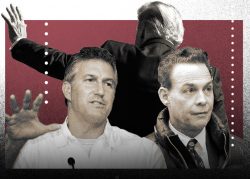“My goal is to make everybody proud of me and to live my life in the proper fashion,” convicted real estate swindler Eliyahu Weinstein said after being freed from prison by then-President Donald Trump.
Looks like he fell short.
Federal prosecutors on Wednesday said Weinstein “picked up right where he left off” after that, defrauding 150 investors out of a staggering $35 million, the New York Times reported.
Weinstead had pleaded guilty to two crimes, including cheating members of his close-knit Orthodox Jewish community out of $200 million with fake real estate investments and land deals, but in the final days of his presidency Trump commuted his 24-year sentence. The White House cited recommendations by celebrity lawyer Alan Dershowitz and a Republican member of Congress from New Jersey, Jeff Van Drew.
This time, authorities said, Weinstein and four co-conspirators allegedly ensnared more than 150 individuals in a $35 million scheme involving promises of profitable investments in scarce Covid-19 supplies, baby formula, and even first-aid kits for war-torn Ukraine.
Weinstein and his co-defendants were charged with wire fraud and conspiracy to obstruct justice. Following an appearance in federal court in Trenton, Weinstein and a co-defendant, Israeli citizen Shlomo Erez, were ordered detained.
Bail was set at $500,000 for a third defendant, Aryeh Bromberg, of Lakewood, New Jersey. Two other defendants, Joel Wittels of Lakewood and Alaa Hattab of Ottawa, Canada, are still at large.
Weinstein committed the Ponzi-style scheme to solicit investments through Optimus Investments, which had operated with Bromberg and Wittels, prosecutors said.
The latter two allegedly lured investors with promises of highly profitable opportunities in fake deals and then channeled the funds they gathered to Weinstein, who used a pseudonym with investors to hide his history.
Dershowitz told the Times he had “little or nothing to do with Weinstein personally,” but only “gave legal advice to an organization that was advocating shortening sentences.”
— James Van Bramer
Read more



